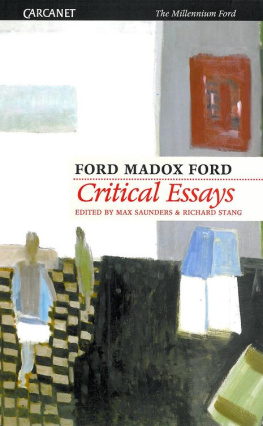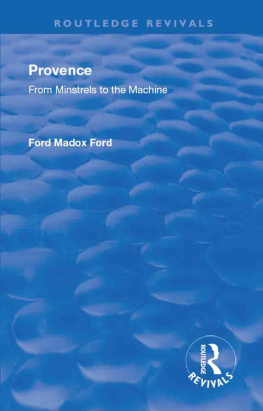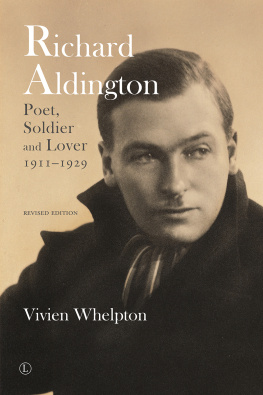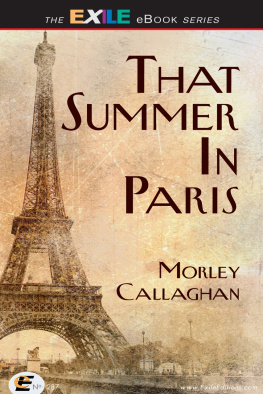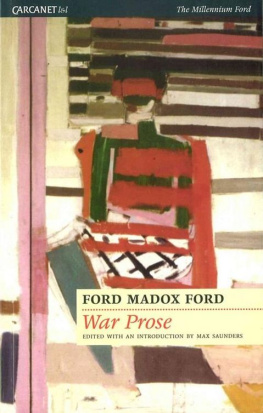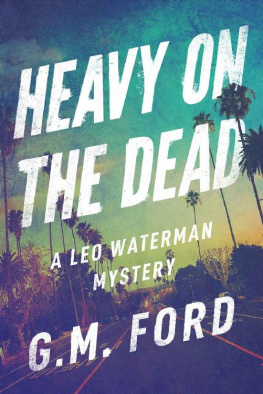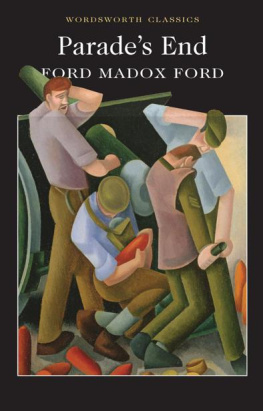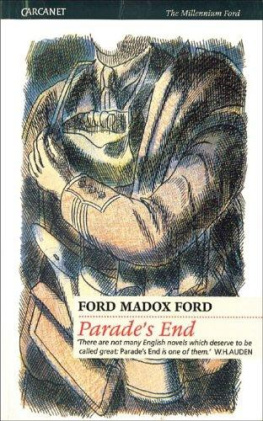The purpose of this volume is to bring together essays very few of which have been republished in books before. Because Ford wrote critical essays all his writing life well over five hundred periodical contributions have been discovered it seemed to the present editors that it would make sense to allow the general reader access to the best of them, especially now that Ford enjoys a rather general recognition as a major twentieth-century author.
Perhaps these essays will send the reader to Fords many books of criticism , such as Thus to Revisit, Portraits from Life, Henry James, Joseph Conrad, The English Novel, and The March of Literature; and to the essays in collections such as Sondra Stangs A Ford Madox Ford Reader, Frank MacShanes Critical Writings of Ford Madox Ford, Brita Lindberg-Seyesteds Pound/Ford, Martin Stannards Norton Critical Edition of The Good Soldier. Work now in print was not included in the present volume since it seemed wasteful to use the limited space available to us reprinting material easily accessible.
The essays are arranged chronologically. They span nearly forty years, covering most of Fords publishing life, from his formative collaboration with Conrad to his last years. Three phases predominate, however, and they correspond to the three phases of his greatest creative intensity, when he was not only prolific, and at his best, as a critic, but was also writing his best fiction. From 1907 to 1910, when completing the Fifth Queen trilogy and writing A Call, Ford was producing weekly reviews for the Daily Mail and The Tribune, then writing for the magazine he founded and edited, The English Review. From 191314, while writing his best pre-war novel, The Good Soldier, and into 1915, he contributed weekly essays to The Outlook. Then in the mid-1920s, while working on his post-war masterpiece Parades End, he founded and wrote for a new magazine, the transatlantic review, as well as writing for other periodicals, and producing one of his best books of critical reminiscence, Joseph Conrad.
These essays, most of which give us Fords response as a reader to work just published, will perhaps help us to understand why Pound claimed in 1914 that Ford was the best critic in England, one might say the only critic of any importance, and Marianne Moore that Fords reviews were of inestimable value to me, as method. most of the books Ford reviewed in the pages of The Tribune, The Outlook, The Daily Mail and other newspapers and magazines. His portraits included writers we no longer read or whose names are only familiar to us from literary histories: Hall Caine, Mrs Mary E. Mann, Maurice Hewlett, Charles Doughty, Lord Dunsany, W.H. Mallock. Many of the books are clearly period pieces not likely to be exhumed. But because Ford asks the right questions when confronting a new work by a contemporary, these reviews of now forgotten books and the larger questions about writing they raise make them worth rescuing.
Interspersed with these are a large number of reviews of more significant figures: Shaw, Pound, Anatole France, Joyce, Wells, Bennett, Galsworthy, Conrad, Hardy, Schnitzler, Gorky, Dostoevsky, Yeats, Frost. In both categories, one reads Fords reviews for what he tells us about literature and its relation to a given time, and in doing that he communicates to us his distinctive note genial and serious, civilized; if sometimes quirky, wrong-headed, and mildly outrageous. Clearly, it is immensely valuable to have the immediate response of an intelligent contemporary, especially one like Ford, who was at the same time reshaping the literary landscape.
Indeed, if all the literary portraits from The Daily Mail, The Tribune, and The Outlook were published as a group, it would provide a great source for understanding the literary situation of that time: the literary diary of one of the great minds of modern literature, showing how the modern movements (Impressionism, Imagism, Vorticism, Modernism) appeared in the cultural milieu of early twentieth-century London.
He was not necessarily interested in judicious criticism. Rather, his instinct as a critic was bold and excessive to follow wherever the friction between the work and his temperament might take him. Always deeply engaged, always vital, his writing tended to proceed by leaps, even overstatement, never to provide a final judgement on the work he was discussing, but to arouse a response in his reader, to provoke thought rather than foreclose it. His deliberately sweeping statements were not meant to be taken literally, but he did want to be taken seriously. Hence, he was never cautious and did not mind being shocking. As he said in The English Novel,
what I am about to write is highly controversial and [ the reader] must take none of it too much au pied de la lettre. I dont mean to say that it will not be written with almost ferocious seriousness. But what follows are suggestions not dictates, for in perusing this sort of book the reader must be prepared to do a good deal of the work for himself within his own mind.
On some of the sweeping statements of that book, he said the reader must object as violently as possible: then, in reaction, thinking it over he will
For Ford, the purpose of his criticism was to force the reader to be open to new impressions. The great enemy of art, as he saw it, was received opinion, stock responses, following conventions for conventions sake. To lose touch with reality with the world outside of ones self would be to forestall the kind of reaction he had to reading for the first time the first Lawrence story he saw, Odour of Chrysanthemums. In Portraits from Life he gives a marvellous vignette of that exemplary close-reading.
His criticism is never systematic, theoretical, abstract, academic. He hated systems and the systematizing mind, the kind of mind he thought of as Prussian, resulting in the kind of work then emanating from German universities, as he hated language which loses touch with the spoken word, poetic diction, conventional language, academic jargon. (The parallels with Wordsworths famous preface to Lyrical Ballads are striking.) For him all writing had to be an individual rendering of what an individual really perceived. Even though he claimed to have hated Ruskin as one of the bearded Victorian greats who made his childhood miserable, Ruskin stated Fords credo as clearly as anyone:
the greatest thing the human soul does in this world is to SEE something, and tell what it SAW in a plain way. Hundreds of people can talk for one who can think, but thousands can think for one who can see. To see clearly is poetry, prophecy, and religion all in one.
Seeing clearly is what most of us do not do most of the time. It follows that when an artist sees clearly, and communicates to us his vision, something in our world has altered: our world has been transformed. According to Ford, in Provence, the authentic note of the great poet is to modify for you the aspect of the world and of your relationship to the world, and in his introduction to Hemingways A Farewell to Arms, he develops this idea:
a writer holds a reader by his temperament. That is his true gift what he receives from whoever sends him into the world. It arises from how you look at things. If you look at and render things so that they appear new to the reader you will hold his attention [.] You

